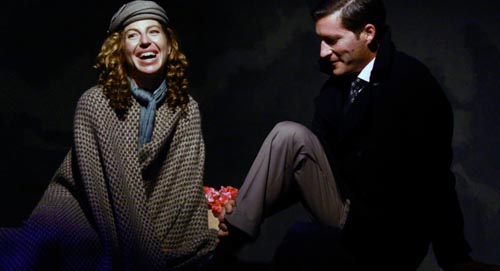
By Cynthia Citron

SANTA MONICA–If you wanted to write a play to honor your father, it might be a bit inappropriate to portray him as a scoundrel. But that’s what Henry Jaglom has done in his new play Train to Zakopane, now having its World Premiere at the Edgemar Center for the Arts in Santa Monica.
The play starts off as what seems to be a simple love story in a “strangers-on-a-train” sort of way. But, as my friend pointed out, because I didn’t get it at first, it soon reveals a sinister subplot that deals with hate and revenge.
The year is 1928 and Poland, still traumatized by the First World War, is becoming trepidatious about the Bolsheviks, Stalin, and “that madman” Hitler. So quite naturally the four passengers sharing a sleeping compartment on their way to Warsaw fall into a conversation that soon underscores their political predilections.
For example, when the otherwise benign priest makes some disparaging comments about Stalin, someone else reminds him that Stalin had studied for the priesthood. “Yes,” the priest responds scornfully, “but that was for the Russian Orthodox Church, not the Catholic!”
In addition to the priest (gracefully played by Stephen Howard), the four travelers include a lively actress (Cathy Arden), a rather sour nurse (Tanna Frederick), and a well-spoken gentleman from the Ukraine (Mike Falkow) who happens to be a Jew and Henry Jaglom’s father.
Almost immediately in the conversation the nurse, Katia, begins making vile anti-Semitic remarks, running through all the stereotypical prejudices that many Europeans, and especially the Poles, held at that time. Her comments are delivered with deep sincerity and make her appear to be quite unpleasant. She warms up quickly, however, to the attentions of Semyon, the Ukrainian gentleman, and soon begins to flirt and become quite coquettish.
Semyon, for his part, responds with warm attention, even while berating her for her vociferous anti-Semitism. He doesn’t reveal the fact that he is Jewish, he explains later, because he feels that he can make a more credible argument if she is under the impression that he is gentile.
After a while he has so beguiled her that he is able to persuade her to disembark from the train with him for a “getting-to-know-each-other” weekend at the next stop—a posh resort town named Zakopane. Both of them had had unhappy experiences in this town, but they don’t let that dissuade them.
Eventually he seduces her and she becomes giddy with love. And he is hoist on his own petard, for he has fallen in love, too. Or is this just a tale of revenge and spite? For, as Semyon had remarked earlier, “Everyone lies to get what he wants.”
Jaglom claims that this is a true story, and that he has written it just as his father told it to him. But there are some inconsistencies. For example, even if Katia were a 32-year-old virgin, as she claimed, she had been a nurse for a long time. Moreover, she had grown up with three brothers. Wouldn’t Semyon’s circumcised penis have given her a clue to his identity as a Jew?
At any rate, this romantic encounter remained with both of them for the rest of their lives, Jaglom says.
Moreover, the acting alone makes this play worth seeing. Director Gary Imhoff has orchestrated a powerful range of emotions in his cast, most notably in the case of Tanna Frederick, the uptight nurse, and Jeff Elam, a Jewish doctor who has a wonderful scene explaining to Semyon why he has been living as a gentile for the past 15 years.
The element in this play that doesn’t work is Chris Stone’s set design. A great deal of effort was put into the design of the train. It has wheels and a track, and makes you think that it’s supposed to move, but it doesn’t. Further, a train compartment, even in first class, is usually a tight fit for four persons, and it would have made the verbal confrontations a lot more intense if the principals were a little cramped and argued face to face instead of declaiming individually to the audience.
As for the rest of the set design, it’s all gunmetal gray and gloomy. Not a spot of color except for some boring pastel scenery in the background. If this was supposed to depict a lush resort for the aristocracy, it missed by many kilometers.
Train to Zakopane was postponed twice because of technical difficulties with the set, but it opened on November 21st and is scheduled to run through March 29th. There will be a hiatus from December 21st to January 8th, and the theater will also be dark on March 8th.
The play will run Thursday through Saturday at 7:30 pm and Sundays at 5. The Edgemar Center for the Arts is located at 2437 Main Street in Santa Monica. For reservations, call (310) 392-7327 or visit www.edgemarcenter.org.
*
Citron is a freelance writer specializing in coverage of theater and the movies. She may be contacted via cynthia.citron@sdjewishworld.com